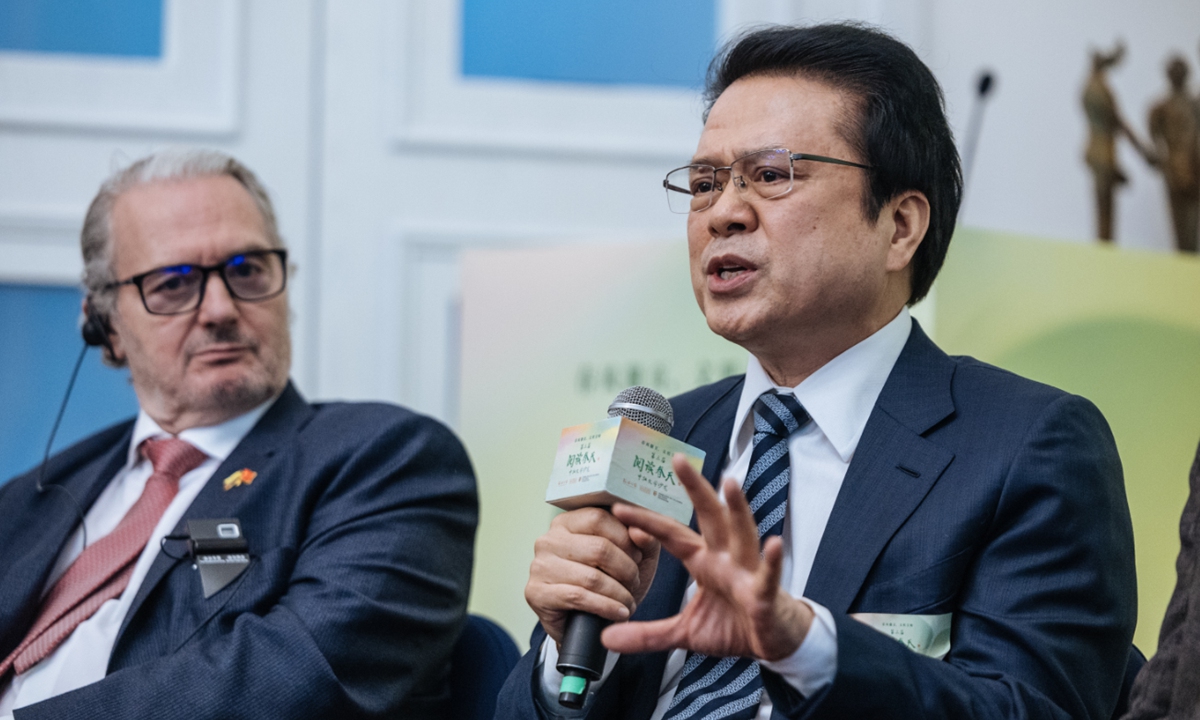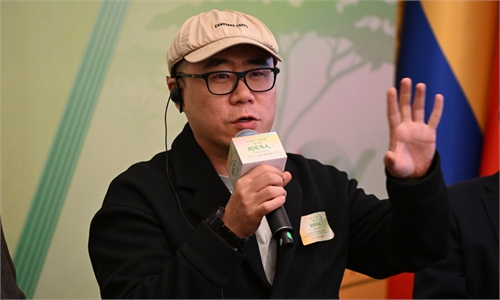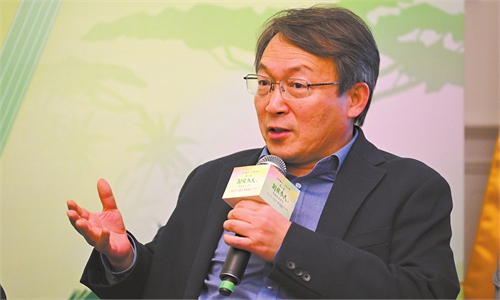ARTS / CULTURE & LEISURE
China and LatAm have many stories worth exploring

A scene at the "Spring Reading" - China-Latin America Literature Salon Photo: Chen Tao/Global Times
Editor's Note:In celebration of the 30th World Book Day, the "Spring Reading" - China-Latin America Literature Salon was held by the Global Times and the Embassy of Colombia in Beijing on April 22, bringing together leading voices in literary translation and cross-cultural dialogue. Among the participants was acclaimed writer Chen Yan, a member of the 14th National Committee of the Chinese People's Political Consultative Conference and vice chairman of the China Writers Association. Chen shared his views on how Latin American literature depicts grand historical pictures in a concise way, China-Latin America literary exchanges and AI's impact on literary creation. This article is based on Chen's speech at the event.

Chen Yan (right) Photo: Li Hao/Global Times
My understanding of Latin American literature mirrors that of many Chinese readers.In 1982, when Gabriel García Márquez's One Hundred Years of Solitude won the Nobel Prize in Literature, it quickly gained popularity in China. Suddenly, every writer, playwright and artist felt compelled to read it - to ignore it was to risk irrelevance in the literary world.
When I first encountered the novel, its complexity baffled me. Yet I persisted, driven by its status as a defining work of the Latin American "literary boom."
In 2016, I led a delegation of writers, artists and archaeologists on a 10-day visit to Latin American countries like Chile, Argentina and Brazil.
Armed with works by Mario Vargas Llosa (The Green House), Octavio Paz, Pablo Neruda and Jorge Luis Borges, I discovered that reading these books while traveling through Latin America was a unique experience.
For example, reading Neruda's works at his former seaside home on Chile's Isla Negra, and then reflecting on Latin American literature in his other former home in Valparaíso, a city of graffiti, led me to have an epiphany.
The graffiti covering almost every building's surface in Valparaíso was incredibly interesting and magical, and helped me connect Latin American literature with the region's art.
The unique narrative style of Latin American literature is closely related to the lifestyle of the people there.
After One Hundred Years of Solitude became popular in China, many Chinese writers drew inspiration from it, including its opening sentence: "Many years later, as he faced the firing squad, Colonel Aureliano Buendía was to remember that distant afternoon when his father took him to discover ice."
This style was prevalent in Chinese literature for a time, and some writers even tried to avoid it, thinking it too similar to Márquez's style.
However, I find this approach very interesting.
Another characteristic of Latin American literature is its ability to transform reality into magic, making everything more real. This is remarkable.
After Márquez's success, Chinese writers gained confidence in our traditional culture. We began to reconsider works which also blend the real and the unreal like In Search of the Supernatural, a 4th-century Chinese compilation of legends, short stories and hearsay concerning Chinese gods, ghosts and other supernatural phenomena; Journey to the West, one of the four greatest Chinese classical novels; and Strange Stories from a Chinese Studio, a collection of Classical Chinese stories written during the Qing Dynasty (1644-1911).
In addition, I believe a most distinctive feature of Latin American literature lies in its concise language, like the "compressed biscuit," be it in the works of Gabriel García Márquez, Juan Rulfo, Alejo Carpentier, or the frequently cited Borges.
These masters have demonstrated an extraordinary ability to tell simple stories that reveal grand history, allowing readers to see the past, present and future. This "compressed biscuit-style" of creation is worth learning from.
As for the influence of Chinese culture and literature on Latin American literature, it can be seen in two ways.
First, many Chinese writers have been translated into Spanish and Portuguese and are now popular in Latin America.
Second, some Latin American writers have shown interest in Chinese culture. Borges, for example, read widely and had a deep understanding of Chinese culture, including Taoist philosophy, the I Ching, an ancient Chinese divination text from the Western Zhou Dynasty (1046BC-771BC); and the four great Chinese classical novels.
He used mirrors as an image in his works, showing his understanding of Dream of the Red Chamber.
He also wrote stories like The Wall and the Books and The Widow Ching-Pirate, which are based on Chinese tales.
Borges is a writer's writer, and his extensive reading and deep research into Chinese philosophy are admirable.
Neruda also had a connection with China. He visited China multiple times and interacted with Chinese writers like Mao Dun. He even wrote works paying tribute to China.
Today, as we discuss exchanges and mutual learning, China and Latin America, especially Colombia, have many common topics and stories worth exploring.
Another topic is that with the rapid development of AI technology, AI tools like ChatGPT and DeepSeek are showing great potential in literary creation, generating various texts and even imitating specific writers' styles.
However, this has also sparked controversies, such as whether AI-generated works have real artistic value and how to balance technological progress with literary tradition.
Looking to the future, it's hard to say how AI will change the role of screenwriters in film and television production. But literature and art are creative, while AI relies on big data. The product it generates depends on the data fed into it.
I think our anxiety about AI is unnecessary.
During the First Industrial Revolution, people were also anxious about labor-saving technologies, as reflected in many of Charlie Chaplin's films.
Today's anxiety is no less than that of Chaplin's era, but I believe that we should stay calm and confident in humanity's abilities.
No one knows how many more industrial and technological revolutions we will experience, but I'm sure creativity will always belong to humans.



